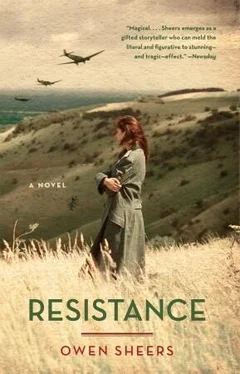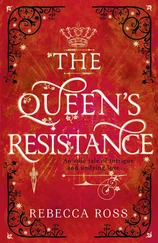Sarah nodded again. Her throat had gone dry. Why was he asking about their names? What did he want to know? What had she done, letting them come in the house? The snow was deep outside. Too deep for anyone to get here quickly. Even if they heard her cries at all.
“I think it is common here. This type of family name?”
Sarah sat back down at the table, her eyes still on the bucket of heating snow. Alex began turning one of the sheep, shifting it onto its other side.
“I was wondering why that is,” Albrecht said more quietly, half to himself. The woman seemed to have stopped talking. He went over to look out of the window again, trying not to look too comfortable, too used to walking around a stranger’s house. But he’d done this so many times he couldn’t hide his familiarity with authority. He’d walked in too many strangers’ houses for the ease he’d so difficultly acquired to shed that simply.
“It’s from the Welsh,” Sarah said suddenly, still keeping her eyes on the bucket. “When everyone spoke Welsh, a son was given the first name of his father. They passed it on so as they got to have long names.” She glanced towards the Bible on the dresser. “My mother’s grandfather still signed himself Hywel ap Thomas ap Dafydd. Son of Thomas, son of David.” She looked up at Albrecht. “When the English came they made it easier for them to understand. That’s why.”
She remembered her mother telling her just this story one day when they were walking down through the fields from delivering milk and eggs to old Mrs. Roberts up the valley.
Albrecht nodded. Her sudden talking had startled him. “Yes, of course,” he said. “Thank you.” He’d only ever read of Welsh in his studies. “My family name too is a first name,” he continued. “Wolfram. Wolfram von Eschenbach was a medieval poet. From Bavaria. I think at some point my family took the name from him.”
Sarah stared back at the bucket, trembling slightly on its hook, the heating snow tapping against its sides. She didn’t want to know about his name. She didn’t want to know anything about him.
Alex had stopped working on the sheep and was looking up at Albrecht. He’d heard him tell Sarah his name, as clear in the flow of incomprehensible English as a stone within a stream. Why was the captain talking so much to this woman? Why was he telling her his name again?
Albrecht returned Alex’s stare. “Alex is from Bavaria,” he said before continuing in German to his sergeant. Alex laughed. His voice was deep, welling from some far place inside him. “But Alex is not a poet,” Albrecht said in English, shaking his head and smiling. Then suddenly, without warning, he saw Alex in Russia again, locked in a struggling embrace with a Red Army soldier. Alex losing his rifle, the Russian lifting his knife. Alex biting at the man’s throat, tearing out his windpipe with his teeth. The man falling at his feet, bubbles of blood popping under his chin, spreading through his greying stubble like ink through blotting paper.
Albrecht’s smile left him and he looked out the window to try and ease the rush of panic this vision always brought. Alex went back to tending the sheep, still smiling at Albrecht’s joke.
Sarah fetched a shallow bowl and, taking the bucket off its hook with a teacloth wrapped about her hand, poured some of the heated water into it before laying it before the two ewes. Then she walked out of the kitchen into the yard without saying anything or looking at Albrecht.
When she came back inside, she tipped a handful of calf nuts into the water. Alex nodded in approval and smiled at her. She ignored him and sat back at the table.
“This will make it hard for you,” Albrecht said, studying the thick folds of snow over the shed’s slate roof.
Sarah felt another shudder of fear. There, again, he knew. This will make it hard for you . Because you’re on your own. You all are. Because there isn’t a man in the valley to help you. That’s what he meant.
She traced the whorls of wood in the surface of the table, her mind racing, searching for a way to lead his talk away from her own situation. Fingerprints of those gone before . She let the wood’s smooth whirlpools lead her.
“I knew a poet once,” she said quietly. “When I was a girl.”
Albrecht turned to face Sarah, frowning. “A poet?”
“Yes. You said your family took their name from a poet. I knew a poet. He lived up at the monastery above our farm. He’d been a soldier before, but he was a poet when I knew him. And a painter.”
Albrecht looked at her blankly. What was she talking about? How did she know a poet out here? Why was she telling him this? Perhaps the snow, the exhaustion, had got to her. Or maybe that light in her eye he’d thought the glimmer of intelligence was, after all, no more than the glint of rural insanity.
“Really?” Albrecht said, strolling over to the dresser again. He stood with his back to her, studying the certificate once more but not reading it. He could hear the sound of the sheep lapping at the mix of water and nuts behind him. Leaning against the dresser his hand knocked something over and he found himself picking up Sarah’s wedding photo again. There she was on her wedding day. With her husband. Thick-shouldered, a farmer in any language. She was smiling, her dark hair pinned up under her veil to expose her neck, fine and slender in the light. She looked like a different woman, and he wished he’d known her then. He hated her for changing. He looked up from the sepia image and caught her eye.
“When did they leave?” he said flatly.
Sarah made a sound as if she’d been punched in the stomach, a long empty gasp. Her eyes welled and her mouth worked like a fish gulping the air for water.
Albrecht felt ashamed. And he felt satisfied. “Your husband and the others,” he continued, his voice colder than before. “When did they leave you?”
Sarah looked at the floor. She felt sick. Her head spun. One of the sheep made a weak groaning bleat and she snatched at the sound like a drowning swimmer grabbing for a lifeline. Dropping to her knees she took its head in her hands, found her own reflection in the brown convex pool of its eye.
“You can go now,” she said, not looking up from the sheep’s face. Her voice grated in her throat.
She pushed the bowl nearer to the ewe’s muzzle and waited. Waited for him to ask her again, for him to order his sergeant out of the room, for his hand to grab her from behind. But instead he just spoke quickly in German to Alex, who got up off the floor and began putting on his gloves as they exchanged a few more words.
“Alex says the sheep in the field will need feeding. They can’t eat the grass.”
She didn’t answer him. Silence. Silence was all she would give him now. Keeping her head bowed to the ewe she listened to their footsteps over the flagstones, then felt the cold blast as they opened the door onto the porch and then the front door. She didn’t lift her head or turn round. He was still there, she could feel him. She could feel his eyes. The silence of his presence pressed at her back, pulled the air taut around her for what felt like minutes.
“Why do they do it?” he said at last from the open doorway, his voice half taken by the wind. “Why do they let themselves be covered like that?”
Sarah stroked the ewe between its ears, felt the animal’s skin warming under her touch.
“Because they give up easy,” she said quietly, not lifting her eyes from the ewe below her. “They let go too easy.”
The cold wind blew at her back. In the corner of her eye snow swirled in across the stone floor. The flames of the fire beside her guttered and flagged. Then the door closed. The turning snow settled, the wind died, and the flames burnt taller once more. She waited for a minute until she could no longer hear them, then got up off her knees. Her wedding photograph was lying on the table, facedown. She picked it up and placed it back on the dresser, then slid the Bible back onto its shelf. She should never have left it out. Taking a broom from the corner of the room, she began sweeping the snow back towards the door. One of the ewes, scraping a hoof over the flagstones, shifted its weight and stood up.
Читать дальше












